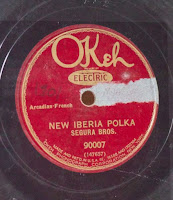The Segura Brothers and their band at White Oak near New Iberia, Louisiana, played this beautiful music.2,3
Les maringouins, a tout mange ma belle,
Ils ont quitté de ses gros orteils,
Pour me faire des bouchons de liège,
Pour toucher les demi-bouteilles,
Et ton papa ressemble à un éléphant,
Et ta maman ressemble à une automobile,
Ton petit frère ressemble à un ouaouaron,
Ta petite soeur ressemble à un coin de banquette.
Given that this song seems to be a children's tune, the Seguras seem to borrow more Acadian traditional melodies compared to the African Creole influences in other melodies of the period. Like other comparable tunes such as "Saute Crapaud", Cajun children had a fascination with songs involving animals and insects. According to his daughter Lorraine:
I asked him, "Why did you make that?" He said, "Just for fun." Everyone would laugh their heads off when he'd play it.4
 |
| Dewey and Eddie Segura |
Keep in mind, these lyrics can't be taken literally. Cajuns found interesting and unique ways to describe someone's appearance. In this case, the mosquitoes caused such bodily havoc, that the subject's family look deformed. Even in Cajun French, the term "coin de banquette" is commonly used to refer to someone who is ugly. A "demi-bouteille" is more of a small whiskey bottle, similar to a flask. "Maringouins" and "ouaouaron" are both Native American words that Cajuns adopted from the Huron/Iriqouis and South American natives respectively.5
The following year, Artelus Mistric recorded the melody as "You Belong To Me". It's quite possible it may have been influential in Leo Soileau's 1937 "Valse D'Amour".
The mosquitoes ate my beauty,
They have left her big toes,
Seem as if they are plugging corks,
To use on half-bottles,
And your dad looks like an elephant,
And your mom looks like a car,
Your little brother looks like a bullfrog,
Your little sister looks like a bench seat.
In 1957, the tune was recorded during a field session for the Ethnic Folkways Library by Bobby Bourke from Avery Island entitled "Les Marigouins Ont Mange Ma Belle". Nathan Abshire was a huge fan of the Segura's music. He had borrowed their tune "My Sweetheart Run Away" for his "Valse de Bayou Teche". In 1949, "Mosquito" became popularly known as Nathan Abshire's "La Valse de Hollybeach".
In 1987, right before his death, Dewey told his daughters that he wanted the Cajun French music heritage, which he had worked his lifetime to promote, to remain alive. In keeping with those wishes, he gave his 78 RPM recordings to them stating, "I know you'll do something with them".1 In 1998, his recordings, along with other artifacts, were put on display at the Acadian Museum of Erath near his hometown. He told his daughter Lorraine that "Mosquito" was his favorite song.
- Abbeville Meridional. 3-5-1999
- https://southernspaces.org/2015/six-degrees-alan-lomaxa-review-and-multimedia-excerpts
- Traditional Music in Coastal Louisiana: The 1934 Lomax Recordings By Joshua Clegg Caffery
- Discussions with Lorraine S D
- Ye Yaille Chere by Raymond Francois
- Lyrics by Stephanie D
W147656-1 A Mosquito Ate Up My Sweetheart 40507-F Columbia 90007 Okeh
W147657-1 New Iberia Polka 40507-F Columbia 90007 Okeh
Find:
Louisiana Cajun Music Volume 1: First Recordings - The 1920's (Old Timey, 1970)
Cajun Louisiane 1928-1939 (Fremeaux, 2003)
Cajun Capers: Cajun Music 1928-1954 (Proper, 2005)
Cajun Country, Vol. 2, More Hits from the Swamp (JSP, 2005)













